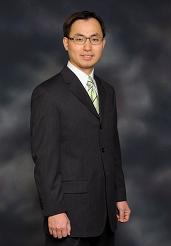 Samuel Cho, MD, is an orthopedic spine surgeon and Assistant Professor of Orthopaedics and Neurosurgery at the Icahn School of Medicine at Mount Sinai in New York. Dr. Cho has expertise in scoliosis surgery, minimally invasive surgery, intervertebral disc biology and cervical spinal surgery. He spends one week each year practicing outside of the U.S. through global outreach programs. Here he discusses why he chose his field, current topics in orthopedics and his upcoming medical mission to China.
Samuel Cho, MD, is an orthopedic spine surgeon and Assistant Professor of Orthopaedics and Neurosurgery at the Icahn School of Medicine at Mount Sinai in New York. Dr. Cho has expertise in scoliosis surgery, minimally invasive surgery, intervertebral disc biology and cervical spinal surgery. He spends one week each year practicing outside of the U.S. through global outreach programs. Here he discusses why he chose his field, current topics in orthopedics and his upcoming medical mission to China. Q: Why did you decide to become an orthopedic spine surgeon?
Dr. Samuel Cho: I didn't know I wanted to be a surgeon when I started medical school. During third year clinical rotations, I explored various fields in medicine, and surgery fit me the most. I liked to see immediate results. It was gratifying to see patients get better right away and I enjoyed working with my hands. I wanted to work with kids and rotated through a number of pediatric surgical subspecialties.
During the orthopaedic rotation, I was assigned to scrub into a scoliosis case at the Shriners Hospital in St. Louis. I really didn't know what scoliosis was or who the surgeon was. Without too much thought, I walked into the OR and that has set the course for a career in spine surgery for me. The surgeon turned out to be Dr. Larry Lenke and he has been a mentor for me since then. I was simply flabbergasted by both the disease and the surgery. I knew what I wanted to do right away and it has never changed since then.
Q: Are there any developments in the field of spine that you are currently excited about?
SC: Instrumentation and surgical techniques continue to improve. We are now able to tackle even the most severe deformity cases that the previous generation was unable to adequately address. I think biologics will continue to play a bigger role as we learn more about it.
Q: Will changes in the U.S. healthcare system impact this development in the spine field?
SC: We will all have to adopt in the next few years to the healthcare changes that are in the works (Obama healthcare). Cost containment will be part of it. We will have to continue to prove to the government and insurance agencies that spine surgery is cost-effective. But I am optimistic that we will continue to be creative and believe that biologics will play a bigger role in the future.
Q: You will be taking a medical mission trip to China soon; what will your upcoming trip involve?
SC: My upcoming trip to China will be one week of medical missions where a team of spine surgeons, Yonjung Kim, MD, Gene Cheh, MD, Andrew Moulton, MD, and myself, will treat Chinese children with severe spinal deformity that had been neglected due to lack of resources and appropriate expertise. Since I started working as an attending, I have been volunteering at least one week out of the year for global outreach focused on surgical treatment of pediatric spinal deformity. This is the second year we are returning to China. I’ve been to other countries previously.
Q: What advice do you have to spine surgeons just beginning to practice?
SC: I would suggest to spine surgeons that are just beginning to practice that they be cautious and conservative with patient selection. Just because you learned to do a certain procedure during fellowship and it worked well for patients that your mentors were treating, it does not guarantee that the same will be true when you join a new practice in a new setting where you and the staff are just getting to know each other.
Second, I would suggest that you not deviate too much from how you have learned to do a certain procedure when you start out. You can incorporate new techniques and technologies once you are comfortable doing things you have already learned and ensured that you can do those things well first. If your training didn’t have a lot of minimally invasive procedures, for example, it’s probably a good idea to start with doing the traditional, open procedures first.
Third, ask for help and input from senior staff in your group or hospital. Experience matters and there will be situations when you are not absolutely sure what to do. Another option is to visit other surgeons who are well known and are willing to share their experiences. Keep up with the literature as most training programs carry inherent bias for many different reasons and it may be wiser to learn what other surgeons think about a given pathology and how they would treat it.
More Articles on Orthopedics:
Dr. Robert Watkins Performs Spine Surgery on Tim Melia of Chivas USA
12 Risk Factors for Infection After Total Knee Replacement
Dr. David Braunreiter Leads New Methodist Sugar Land Sports Medicine Fellowship Program


